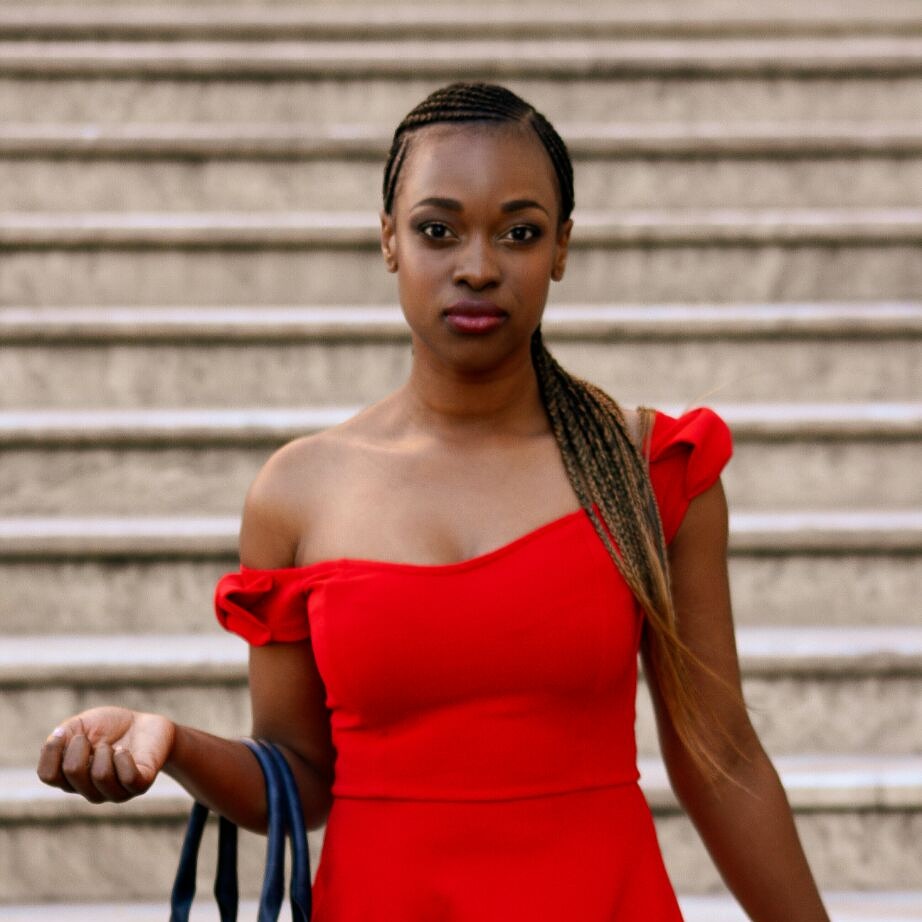
Konya Shamsumi: What is the process of writing a poem like for you? Is it a lot of hard work or easy?
Nkateko Masinga: It’s different with each poem. I’ve had poems that have woken me up in the middle of the night and wrestled with me until daybreak, and this is not to say that by the time the sun comes up the poem is complete, but that the first draft of something (it might not end up as a poem) has been created and needs to be filed. I recently saw a thread on Twitter asking people how they digitally file the various drafts of their poems and the answers ranged from Dropbox folders and Google Docs to having written drafts on paper and then only typing the poem out when it is in its final stages. Writing a poem occurs in several stages for me: there is the first draft, several drafts that occur in-between and then the final version that gets sent out to the world. I’m very impatient, so I often make the mistake of sending a poem out before it is ready. Someone on Twitter said, “A poem isn’t complete just because you are tired” and that taught me to not consider a particular draft as “final” just because I am tired of working on it, but to look at it again with well-rested eyes at a later stage.
Rejection letters for not-quite-ready poems are my portion in life and when I receive one, I try to understand the feedback (if there is any) and sit with the poem again. I have also received rejection letters for poems I have felt were ready, even poems that other people have read and felt were ready to submit, and the lesson in this is that there is no formula and there are no guarantees. You cannot judge your work based on the reaction of another person, or else you will always be writing for the approval of others and not for yourself. At one point I was secretly envious of people who had writing groups, because their almost-poems would be seen and critiqued by trusted peers before being sent out. When I joined such a group for the first time a few years ago, I received much-needed affirmation and feedback from the other writers but I only started to write better when I learnt about form and took the time to practice techniques I learnt in podcasts (The Iowa Summer Writing Festival’s Eleventh Hour series is a great one to listen to) and this taught me that joining a group is not a shortcut but requires you to first do the work alone. Now I’m less envious and more intentional about my own process.
I’ve had poems come to me in a fury of words and images, and some of these are now resting in a MS Word document on my laptop because I’m still grappling with them, pruning where and when I can. I think the most important thing is to find out what a poem is trying to do (and what you are trying to do with it in response) and how long that takes differs for each poem. Daily prompts help me to start new poems, or add to existing ones, and now I am learning to workshop poems that were written as responses to prompts, urging them to exist beyond the prompt. Writing is fun, and each new poem excites me because I get to play around with form and structure. My favourite form is the pantoum and lately I’ve been having fun rewriting free-form poems as pantoums and it’s been interesting to see how a line can mean something completely different when you change what comes before or after it. I teach my workshop students every new form that I learn and show them good examples and also share my not-quite-there attempts so they can see that there is a process. The final product doesn’t just appear on the paper or screen, you have to work at it and this might be hard or easy work, but it is work nonetheless.
Konya Shamsumi: Please describe your sense of identity in this or any possible world in imagery or metaphor?
Nkateko Masinga: I’m a witch casting spells with my words. I’ve always been obsessed with the idea of flying and having supernatural powers, and the first form this obsession took was that of an angel. In my poems, “There Must Be Black Angels in Heaven” and “No City for Black Angels”, I asked whether there are angels that look like me and the answer kept coming back as No. Last year, when I started writing poems with caesurae, I played around with the idea of being a witch instead of an angel and I wrote a Christmas-themed poem inspired by Nina Simone’s version of “I Put a Spell on You”, which I started as follows:
you’ve given me no choice / but to join a coven for the complimentary book of spells / show up unwanted at your house for Christmas lunch / chanting in Xitsonga and Yoruba instead of singing carols
At the end I wrote:
let me be your Christmas miracle / a reincarnation / I am coming back to you / and I don’t care if you don’t want me / I am yours / I put a spell on you / because you’re mine / close your eyes / say a prayer / Merry Christmas.
Lately my work has been interrogating the labels we assign to people and how these labels are so difficult to escape from, how they box us into an identity that doesn’t fully define who we are. So, when someone refers to me as an angel because I’m kind and polite on a particular occasion, what happens when I’m upset and start behaving in the opposite manner? Will I still be an angel then? I am learning that I can call myself whatever I want to and that requires a bit of witch-work: that of reinventing myself, or casting spells on my identity.
Konya Shamsumi: If any of your poems could literarily save a person’s life, which poem would it be and can you describe the person whose life you think it would have saved?
Nkateko Masinga: If there’s a poem I wish could save a life, or bring someone back to life, it would be “heroin(e)”, which I wrote for my late best friend, who passed away after a drug overdose:
heroin(e)
press backspace once
& hello turns to hell
even lover without the l
spells over
my friend. my beloved.
when you said heroin(e),
i thought you needed me.
not the drug.
either way, i wasn’t there
press backspace once &
heroine turns to heroin
click view history once
and you turn to drugs
i, to soft rock and boys,
both of us too far gone.
press the space bar once
and beloved becomes
be loved. oh, be loved.
please be loved,
even if it’s not
by me. rest easy.
(assuage my guilt)
dial 911 &
nobody saves
either of us
i thought we were taking it together,
this life trip. it’s no fun without you.
i have been jaywalking
since you walked away
i will be (guilt)-tripping
until i join you up there
I wish all we had to do was press Backspace to bring someone back, but it doesn’t work that way. This poem took me to the depths of my own guilt and despair about her death and in a way, saved my own life because it made me realize that I want to live, even if it means missing her. The world looks different, somewhat colder, in the absence of those we love, but there is beauty in remembrance, in the embers left behind.
Konya Shamsumi: What does Africa mean to you, as potential or reality?
Nkateko Masinga: Africa is me. It’s my home. It’s my identity. When I was in the U.S. as a Mandela Washington Fellow, I befriended a few African-Americans in Brooklyn, New York, and when they introduced me to someone new they’d say “This is my friend from Africa”, which made me uncomfortable at first because it felt like I was being othered, but I eventually found that it was a great teaching opportunity because often the other person would say, “Oh, which part of Africa are you from?” And this allowed me to talk about home in the way I experience it and dispel some of the myths and misconceptions they may have had about the continent, one being that Africa is a single country with wild animals roaming freely on the streets. Another way that I have begun to understand my place on this continent is by visiting other African countries and learning that there are as many ways to be African as there are Africans, whether at home or in the diaspora. We are defining what Africa is and what it can be, by merely existing in it and speaking of it.
Konya Shamsumi: Could you share with us one poem you’ve been most impressed or fascinated by? Tell us why and share favorite lines from it.
Nkateko Masinga: My favourite poem right now is “Ode to Dalya’s Bald Spot” by Angel Nafis. My favourite lines are:
you ever look at a thing
you ain’t make, but become
a mother in the looking?
There is so much tenderness in this poem it makes me cry each time I read it. Here is the poem in its entirety:
my sister wraps the throw
around herself on the small
cream loveseat & i know
for sure that she is not
a speck of dirt on a pill.
she coughs & sniffs up all
the lucky air in the room
into her excellent nostrils,
which are endless
holy wells replenishing
the soft architecture of her guts.
not even the lupus can interrupt
this ritual of beholding.
you ever look at a thing
you ain’t make, but become
a mother in the looking?
our blood is a thread tied
around my finger, tied
around her finger, that helps
me love. when her knees
swell, when her joints rust,
when her hair thins & flees
making a small continent
of skin on the side of her head,
i am witnessing her in whatever
state her body will allow.
Bismillah to the brain that
put my name next to her name
and said look at this girl your
whole life and know some kind
of peace. littlest bald spot, that no one
expected or knew how to love
you remind me of us.
i know Dalya’s thinking, how ugly
what a shame, but i wanna
build a mosque right then
& there. make an annual
hajj to that brown meadow.
slick as a coin. little planet
uncolonized. flagless.
her awful, but her own.
Nkateko Masinga is a South African poet and 2019 Fellow of the Ebedi International Writers Residency. She was nominated for a Pushcart Prize in 2018 and her work has received support from Pro Helvetia Johannesburg and the Swiss Arts Council. Her written work has appeared in Brittle Paper, Kalahari Review, the U.S. journal Illuminations, UK pamphlet press Pyramid Editions, the University of Edinburgh’s Dangerous Women Project, and elsewhere. She is the Contributing Interviewer for Poetry at Africa In Dialogue, an online interview magazine that archives creative and critical insights with Africa’s leading storytellers.












Leave a Reply